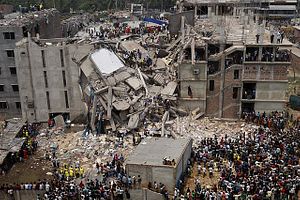On April 24, labor conscious consumers all around the world turned their clothes inside out and asked: who made my clothes? This simple yet powerful question is part of the initiative launched by Cary Somers, founder of Fashion Revolution Day and strong advocate of fair trade and ethical fashion in UK. The global movement aims to highlight pressing labor safety issues and to campaign for change within the fashion industry.
The choice of April 24 was not arbitrary. That date marks the anniversary of the tragic Rana Plaza collapse, two years ago, in Dhaka, Bangladesh. In this tragic incident, 1,129 workers died, and more than 3,000 were injured. The first Fashion Revolution Day took place globally on April 24, 2014, on the theme of “Who Made Your Clothes?” In the aftermath of the event, the Bangladeshi government committed to the safety of workers with regular inspections.
“There have been many improvements in the fashion supply chain since the dust has settled on the Rana Plaza disaster, although it is unfortunate that it has taken a tragedy of this scale to start to bring about change,” says Somers.
Two years later, factory workers are still fighting for their rights and protection. According to a recent report presented by Human Rights Watch, factory owners in Bangladesh employ tactics which mistreat their workers by preventing them from forming unions. If formed, these unions would only protect the workers, their rights, and help them negotiate wages. In developing countries, factory workers and laborers often don’t get their due rights and protection easily. Worker exploitation runs rampant across industries and organizations in many developing states. In some cases, marginalization and manipulation begin in childhood. Children work in exchange for menial wages. In some cases, children undertake unpaid domestic work in exchange for shelter and food.
A detailed report released by Human Rights Watch notes that some of the problems persistently being faced by the workers include forced overtime, verbal and physical abuse, and denial of paid maternity leave. In one instance, a pregnant worker was beaten with metal curtain rods by men who were hired by the factory owners because she dared to organize a union. In her own words, “I was called to the chairman’s room and taken to the third floor management room which is used by the management and directors and there I was beaten.”
According to Somers, “the Bangladesh Accord is a significant milestone towards better working conditions in Bangladesh, and hopefully throughout the industry. The new business model being developed is based more on a bottom up than a top down approach, with stakeholder engagement throughout the supply chain, as well as amendments to labor law, improved training and improvements to fire and building standards.”
But Somers admits that a lot still needs to be done: “The minimum wage still covers only 60 percent of the cost of living in a slum. The Australian Fashion Report published last week found that 86 percent of fashion brands surveyed were not actively seeking to pay a living wage to the workers in their supply chains,” she notes.
The Clean Clothes Campaign states on its website that the families of those affected by the Rana Plaza collapse are owed $30 million in compensation. The site also compiles a list of brands that still need to pay the compensation.
Unfortunately, worker exploitation is not limited to Bangladesh; it extends to other countries in the region, including India and Pakistan. A general lack of education, poverty, and gender discrimination are some of the main factors contributing to abusive labor practices in the region.
Recently, dozens of female factory workers in a small factory in Kerala, India were stripped searched by their supervisors. According to the Times of India, sexual and physical abuse is routine treatment meted out to women in these factories. The same report explains that international consumer activism has helped empower several hundred women, especially in garment factories, which is the second largest sector to employ women. One of the awareness training programs is a project led by the Fair Wear Foundation (FWF) which received a grant from the UN Trust Fund to End Violence Against Women.
In Pakistan, however, worker protection and welfare plans lack efficacy and accountability. In 2012, two major factory fires broke out in Karachi and Lahore, claiming the lives of 216 workers and injuring many more. Workers described how they jumped out of third floor windows to escape the blaze in Karachi, where many of the 191 victims were trapped in a basement. And in Lahore, staff at a shoe factory claimed a faulty generator sparked the fire that killed 25 people. Most of the garment factory deaths were caused by suffocation as people caught in the basement were unable to escape.
































